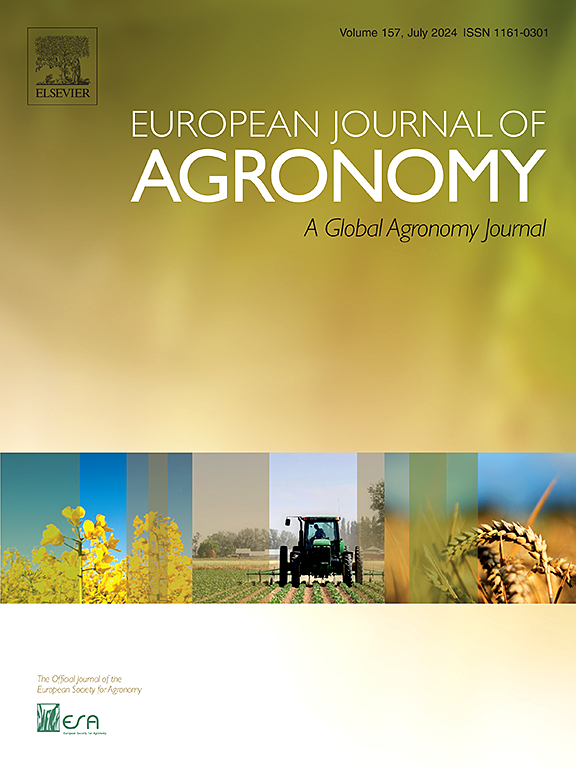Productivity of saline soils can be improved by integrating soil–crop system management
IF 4.5
1区 农林科学
Q1 AGRONOMY
引用次数: 0
Abstract
Appropriate field management strategies are essential for improving crop productivity and promoting agricultural sustainability in saline–alkaline soils. To explore the potential of synergistic soil improvement and optimal crop management for agricultural production, this study evaluated crop yield, resource utilization, and soil quality in a field experiment with monoculture spring maize cultivation in a coastal saline soil region from 2015 to 2019. Compared with farmers’ practices, improved soil management (gypsum/cattle manure), crop management (variety/density), and a combination of both (ISCM) significantly decreased the sodium content, sodium removal rate, and pH by 51.5–60.2, 9.5–35.2, and 9.9 %, respectively, which increased soil organic carbon and total nitrogen by 31.9 and 22.2 %, respectively. Overall, ISCM was the most prominent in processing. As a result, ISCM increased yield and partial factor productivity of nitrogen by 37.2 and 94.5 %, respectively, and reduced N fertilizer use by 28.6 %. Therefore, soil–crop management, particularly the ISCM strategy, can successfully improve the saline soil environment, increase agricultural productivity, and achieve sustainability under intensive farming practices on saline land.
通过土壤-作物系统综合管理可以提高盐碱地的生产力
适当的田间管理战略对于提高盐碱地作物生产力和促进农业可持续性至关重要。为探索土壤协同改良和作物优化管理在农业生产中的潜力,本研究于2015 - 2019年在滨海盐碱地进行了春季玉米单作大田试验,评估了作物产量、资源利用和土壤质量。改良土壤管理(石膏/牛粪)、作物管理(品种/密度)及两者结合(ISCM)使土壤钠含量、钠去除率和pH分别降低了51.5 ~ 60.2、9.5 ~ 35.2和9.9 %,土壤有机碳和全氮分别增加了31.9和22.2 %。总体而言,ISCM在加工方面最为突出。结果表明,ISCM使氮肥产量和部分要素生产率分别提高37.2%和94.5% %,氮肥用量减少28.6% %。因此,土壤作物管理,特别是ISCM战略,可以成功地改善盐碱地环境,提高农业生产力,并在盐碱地集约耕作方式下实现可持续性。
本文章由计算机程序翻译,如有差异,请以英文原文为准。
求助全文
约1分钟内获得全文
求助全文
来源期刊

European Journal of Agronomy
农林科学-农艺学
CiteScore
8.30
自引率
7.70%
发文量
187
审稿时长
4.5 months
期刊介绍:
The European Journal of Agronomy, the official journal of the European Society for Agronomy, publishes original research papers reporting experimental and theoretical contributions to field-based agronomy and crop science. The journal will consider research at the field level for agricultural, horticultural and tree crops, that uses comprehensive and explanatory approaches. The EJA covers the following topics:
crop physiology
crop production and management including irrigation, fertilization and soil management
agroclimatology and modelling
plant-soil relationships
crop quality and post-harvest physiology
farming and cropping systems
agroecosystems and the environment
crop-weed interactions and management
organic farming
horticultural crops
papers from the European Society for Agronomy bi-annual meetings
In determining the suitability of submitted articles for publication, particular scrutiny is placed on the degree of novelty and significance of the research and the extent to which it adds to existing knowledge in agronomy.
 求助内容:
求助内容: 应助结果提醒方式:
应助结果提醒方式:


